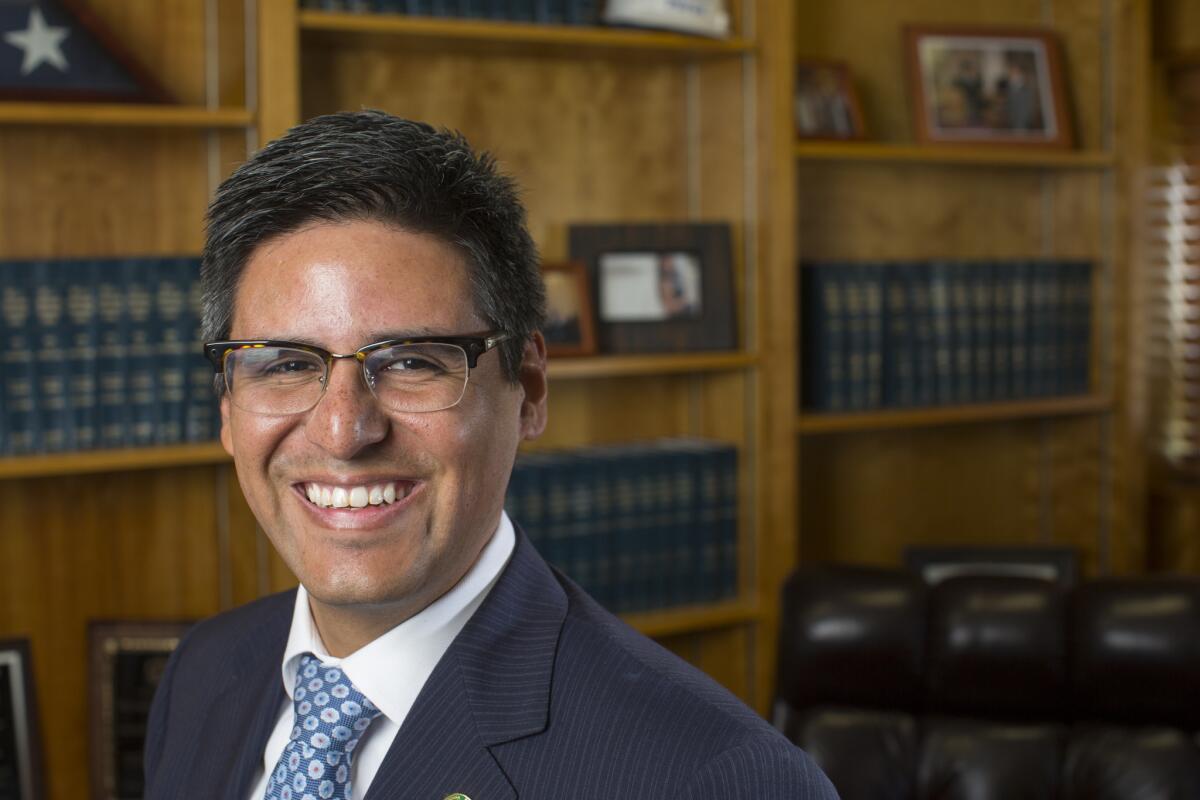Leader of Legislature’s moderate Democrats will resign to seek government relations job

Henry T. Perea
- Share via
Reporting from Sacramento — For the last five years, Assemblyman Henry T. Perea, the leader of an ascendant caucus of business-aligned Democrats in the Legislature, has been a central player in major California policy debates, ranging from water to climate change. On Tuesday, he abruptly took himself out of the fray.
Perea announced he will resign from the Legislature at the end of the year, nearly one year before his term was set to expire. The Fresno Democrat plans to take a government relations job that will keep him a presence at the Capitol, although he said he has not made a final decision about where he will land.
“It’s a generational opportunity — one that was unexpected but is before me today,” Perea said in an interview before he made the announcement in a news release Tuesday afternoon. “And it’s the right decision for me and my family.”
As chairman of the unofficial, but increasingly influential, caucus of moderate Democrats, Perea’s influence was most apparent in scaling back California’s sweeping climate change law this year.
Facing resistance from Perea and centrist Democrats, Senate President Pro Tem Kevin de León (D-Los Angeles) and Gov. Jerry Brown dropped a provision to slash gasoline use on state roads in half by 2030.
Perea said he was guarding his constituents against higher prices at the pump. Detractors, including De León and environmental groups, said Perea and other moderate Democrats were too cozy with oil interests, who have spent lavishly to get industry-friendly lawmakers elected.
The resignation underscored the ease with which lawmakers can seamlessly transition to advocacy positions, despite “revolving door” laws that aim to limit such ties between the public and private sectors.
Lawmakers cannot lobby the Legislature for one year after they leave office, but they can lobby other branches of government — such as the governor’s office or state agencies — immediately. And in certain government relations posts, former legislators act more as advisors or consultants, positions from which they can weigh in on policy but are not required to register as a lobbyist.
“In some ways the revolving door provisions are somewhat symbolic,” said Jessica Levinson, professor of election law at Loyola University in Los Angeles and an expert on political ethics.
In February 2013, then-state Sen. Michael Rubio (D-Shafter) resigned to take a job directing government affairs at Chevron. Later that year, former Sen. Bill Emmerson (R-Redlands) left his seat to join the California Hospital Assn., overseeing its team of lobbyists. Neither former lawmaker has registered as a lobbyist so they are not subject to the one-year waiting period.
Levinson, who serves as president of the Los Angeles City Ethics Commission, said revolving door limits are meant to reduce perception that former legislators are using elected office as stepping stones for personal gain — or that sitting lawmakers are unduly influenced by former colleagues.
“We don’t totally trust lawmakers to cycle in and out of government,” Levinson said. “If everyone was altruistic and honest all the time, we wouldn’t have the Political Reform Act,” which sets ethical standards for politicians.
But others say the jump to advocacy is a logical next step for legislators.
“It is easy to forget that legislators are human with the same demands and desires as the people they represent, including the need to support their family and save for retirement,” said Phillip Ung, director of public affairs for California Forward, a nonpartisan public policy group.
Perea, who earns the legislators’ base pay of $97,197, said several business interests approached him — he did not disclose which ones — after the end of session in September.
Such jobs are hard to come by in the Capitol, he said: “Once people get in these positions, they tend to make a career out of it.”
After his announcement, outgoing Assembly Speaker Toni Atkins (D-San Diego) praised Perea as a “forceful advocate for his district and the people of the Central Valley.”
“While my colleagues and I in the Assembly will miss his intelligence and good humor, we are delighted he is pursuing a role where he can still have a voice in helping shape public policy,” Atkins said.
But the praise was not universal, particularly among those who had battled with Perea over the climate change law.
Matt Nelson, managing director of Presente.org, which squared off against moderate Democrats over environmental issues, criticized Perea as appeasing “corporate paymasters” and as someone who “who took the side of the oil and gas companies after taking their money.”
The lawmaker’s resignation “should be a moment to reflect on the damage caused by the dirty energy industry, and an opportunity to expose corporate influence and hold corrupt and corruptible politicians accountable,” Nelson said.
Perea was first elected to his seat in 2010. He lives in Fresno with his wife Yahaira, who is expecting their third child.
The district is nearly 70% Latino, and Democrats hold an almost 20-percentage-point advantage among registered voters.
Two candidates have already registered to run for the seat in 2016: Democrat Joaquin Arambula, a doctor and son of former Assemblyman Juan Arambula, and Clint Olivier, a Republican member of Fresno City Council.
Once Perea vacates the seat Dec. 31, Brown has 14 days to call a special election.
For more on California government and politics, visit latimes.com/politics and follow @melmason
ALSO
This Democrat’s decision on climate change could be a game changer
The inside story of how power struggles doomed Jerry Brown’s top priority
California GOP sitting out Senate race in conservative-leaning swing district
More to Read
Get the L.A. Times Politics newsletter
Deeply reported insights into legislation, politics and policy from Sacramento, Washington and beyond. In your inbox three times per week.
You may occasionally receive promotional content from the Los Angeles Times.











